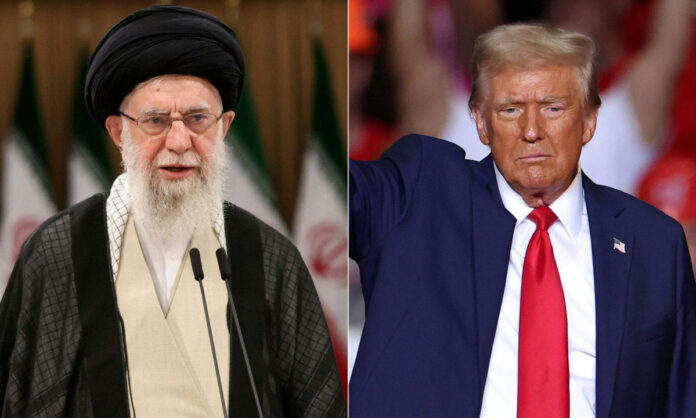Israel and Iran exchanged fire again on Wednesday, the sixth day of strikes in their most intense confrontation in history, fuelling fears of a drawn-out conflict that could engulf the Middle East.
Here are the latest developments:
Khamenei warns US against intervention
Supreme leader Ayatollah Ali Khamenei said on Wednesday that his nation would “never surrender,” while warning Israel ally the United States it would suffer “irreparable damage” if it intervenes in the conflict.
“This nation will never surrender,” Khamenei said in a speech read on state television.
“America should know that any military intervention will undoubtedly result in irreparable damage.”
US President Donald Trump had stepped up his rhetoric, saying on Tuesday that the United States knows where Khamenei is located but will not kill him “for now.”
In another post, Trump also appeared to demand Iran’s “UNCONDITIONAL SURRENDER!” as he fuelled speculation over whether the United States would join Israel’s attacks.
US officials stressed he has not yet made a decision about any intervention.
Night of strikes
The Israeli military said on Wednesday that 50 Israeli fighter jets struck about 20 targets in Tehran overnight, and that it had intercepted a total of 10 drone attacks launched from Iran.
“As part of the broad effort to disrupt Iran’s nuclear weapons development program, a centrifuge production facility in Tehran was targeted,” the Israeli military said.
The UN nuclear watchdog later said two centrifuge production facilities had been struck.
Meanwhile, Iran’s Islamic Revolutionary Guard Corps claimed it had launched hypersonic Fattah-1 missiles at Tel Aviv.
Hypersonic missiles travel at more than five times the speed of sound and can manoeuvre mid-flight, making them harder to track and intercept.
No missile struck Tel Aviv overnight, despite Iran’s claims that its attacks were “repeatedly shaking the shelters,” though Agence France Presse (AFP) photos show Israel’s air defense systems activated to intercept missiles over the commercial hub.
Rising toll
Israel’s attacks have hit nuclear and military facilities around Iran, as well as residential areas.
Residential areas in Israel have also been hit, and foreign governments have scrambled to evacuate their citizens from both countries.
Israeli Prime Minister Benjamin Netanyahu’s office said on Monday that at least 24 people have been killed in Israel and hundreds wounded since Iran’s retaliatory strikes began Friday.
Iran said on Sunday that Israeli strikes had killed at least 224 people, including military commanders, nuclear scientists and civilians.
Doing the ‘dirty work’
Israeli Foreign Minister Gideon Saar said that “regime change is not an objective of this war—it can be a result, but it’s not an objective.”
French President Emmanuel Macron warned that any attempt to change the government in Iran would result in “chaos.”
German Chancellor Friedrich Merz expressed support for the campaign Tuesday, saying in an interview that “this is the dirty work Israel is doing for all of us” against Iran’s “mullah regime.”
Internet restrictions
Iran said Wednesday it had detained five suspected agents of Israel’s Mossad intelligence agency on charges of tarnishing the country’s image online, Iranian news agencies reported.
“These mercenaries sought to sow fear among the public and tarnish the image of the sacred system of the Islamic Republic of Iran through their calculated activities online,” the Tasnim and ISNA news agencies quoted a statement from the Revolutionary Guards as saying.
Iran announced last week that it was placing temporary restrictions on the internet for the duration of the conflict. Numerous sites and apps have since been at least partially inaccessible.
The authorities appealed to the public on Tuesday to “minimize their use of equipment connected to the internet and to take appropriate precautions” online.
State television appealed to Iranians on Tuesday to delete WhatsApp from their phones, charging that the messaging app gathers users’ location and personal data and “communicates them to the Zionist enemy.”
A WhatsApp spokesperson hit back against the claims, saying: “We’re concerned these false reports will be an excuse for our services to be blocked at a time when people need them the most.”








